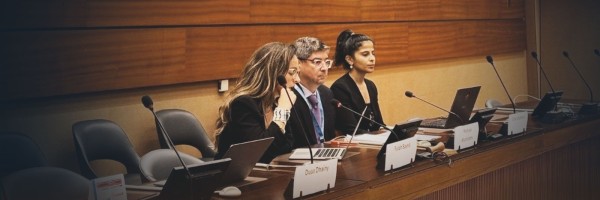On 16 February 2023, ALQST launched its in-depth report on the rights violations accompanying Saudi Arabia’s futuristic Neom megacity project with a panel discussion among experts in the fields of human and labour rights. The project, announced in 2017 and currently under construction, will cover 26,500 km2 along the Red Sea in the province of Tabuk in northwest Saudi Arabia and is the centrepiece of Crown Prince Mohammed bin Salman’s “Vision 2030” economic development programme. It is working with investors, businesses, consultants and migrant workers from around the world, and already having a profound impact on local communities. You can read the full report, The Dark Side of Neom: Expropriation, expulsion and prosecution of the region’s inhabitants here and watch the full panel discussion on Twitter here.
The panel discussion was moderated by ALQST’s Executive Director Julia Legner, and the speakers were:
- Lina Alhathloul (Head of Monitoring and Advocacy, ALQST for Human Rights);
- James Lynch (Founding Co-director, FairSquare);
- Sarah Leah Whitson (Executive Director, Democracy for the Arab World Now (DAWN); and
- Isobel Archer (Senior Labour Rights Researcher, Business & Human Rights Resource Centre).
Lina Alhathloul spoke about the findings of the report, which drew heavily on first-hand testimonies from victims, and elaborated on the challenges involved in gathering such evidence. Lina described the Saudi authorities’ inadequate compensation policies following the forced displacement of local inhabitants, predominantly members of the Huwaitat tribe. She also discussed the ongoing prosecution of dozens of members of the tribe for their peaceful opposition, on charges including that of communicating with human rights organisations and journalists; several have been given harsh sentences of up to 50 years in prison or even the death penalty.
James Lynch described Neom’s opaque legal framework and the uncertainty that this creates when trying to assess human rights risks, He explained that over the next three years hundreds of thousands of migrant workers will be recruited to build Neom, and they will be at high risk of exploitation and abuse because of both the laws and labour practices in Saudi Arabia. The kingdom does not publish data on worker deaths, but some information can be found via the workers’ countries of origin: for instance, 58% of Nepalese worker deaths in Saudi Arabia have been the result of work accidents, suicides or unknown causes that were not investigated. James drew attention to the responsibilities of international companies that are in effect profiting from grave human rights abuses in Saudi Arabia, and wondered how robust due diligence on human rights can be in an environment where no independent voices are allowed to provide a credible risk assessment.
Broadening the scope of the debate, Sarah Leah Whitson addressed the demolition of homes and eviction of residents that has also taken place in Jeddah as part of an urban renewal project impacting over a million people. She challenged the view held by some that the abuses occurring in the course of building Neom and redeveloping parts of Jeddah are “necessary evils” in the greater cause of Mohammed bin Salman’s so-called reforms. This is not in fact a valid defence in mitigation of the many crimes taking place. Sarah also addressed the businesses who are involved, or may become involved, in constructing Neom or re-building Jeddah, and argued that we can successfully work to extract concessions from these businesses and commitments to reform.
Isobel Archer discussed the dangers faced by migrant workers, who form the majority of the private sector workforce across Saudi Arabia and the broader Gulf region. Workers are exposed to severe risks at every stage, starting right from the recruitment process. They frequently have to bear huge financial costs, and routinely face issues of wage theft, delayed wages, partial payment or no payment at all. Common health and safety risks include heat stress, poor living conditions and restrictions on freedom of speech and movement. Isobel said the response of international companies to such violations is often disappointingly slow and lacking in transparency, with companies not even developing policies on paper for the protection of migrant workers, let alone implementing them. It would be a huge mistake for companies involved in Neom to rely on this lack of documentation.




